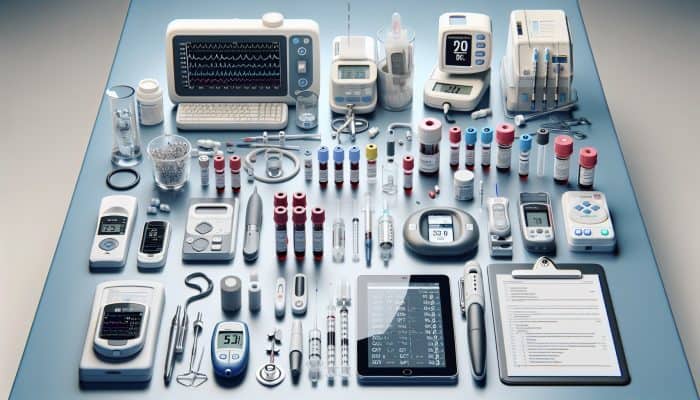Your Comprehensive Guide to Diabetes Blood Testing: Understanding Procedures and Importance
Key Components and Procedures Involved in a Diabetes Blood Test

Diabetes Blood Test in Abingdon-on-Thames: A diabetes blood test serves as an essential medical evaluation aimed at measuring your blood glucose levels, which is key for both diagnosing and continuously monitoring diabetes. This fundamental test plays a critical role in managing your overall health, as it detects any variations in your glucose levels that may signify the presence of diabetes or prediabetes. Various types of blood tests are available, each customized to suit individual needs and specific situations. Common examples of diabetes blood tests include:
- Fasting Blood Glucose Test
- Oral Glucose Tolerance Test (OGTT)
- Haemoglobin A1c Test
- Random Blood Glucose Test
- Continuous Glucose Monitoring
- Fructosamine Test
By familiarizing yourself with these tests, you empower yourself to take proactive control of your health and make enlightened decisions regarding the management of your diabetes.
The Crucial Role of Consistent Blood Testing in Diabetes Management
Engaging in regular testing is fundamentally important for effectively managing diabetes, allowing individuals to continuously monitor their blood sugar levels over time. This ongoing evaluation is vital for making necessary adjustments to medications, dietary habits, and lifestyle choices to maintain optimal health. The benefits of committing to regular testing include:
- Early detection of diabetes
- Prevention of complications such as neuropathy and retinopathy
- Enhanced control of blood sugar levels
- Informed decision-making regarding dietary choices and exercise
- Improved communication with healthcare professionals
By establishing a routine of consistent blood tests, individuals can adopt a proactive approach to their health and overall well-being, leading to more effective diabetes management.
Determining the Optimal Frequency for Diabetes Blood Testing
The recommended frequency for diabetes blood tests varies based on a multitude of factors, including whether you have received a diagnosis of diabetes, your individual risk factors, and your healthcare provider’s recommendations. For those diagnosed with diabetes, testing may be advised anywhere from a few times a year to multiple times daily. Conversely, those at risk may be advised to have testing conducted annually. Regular medical check-ups are crucial for monitoring any changes in your health status, enabling timely adjustments to your management plan.
Finding Reliable Diabetes Blood Testing Services in Abingdon-on-Thames
Identifying Local Clinics and Hospitals Offering Testing Services
In Abingdon-on-Thames, a variety of healthcare facilities provide comprehensive diabetes blood testing services. Notably, Abingdon Hospital offers extensive diabetes care along with a range of testing services. Additionally, many GP clinics spread across the town are well-equipped to perform blood tests and manage diabetes effectively. These local resources guarantee that residents have access to vital diagnostic services without the inconvenience of traveling long distances, ensuring timely and efficient care.
Exploring Private Testing Services for Enhanced Diabetes Care
For individuals who desire quicker or more personalized services, private clinics in Abingdon-on-Thames present options for diabetes blood testing. These facilities often deliver results more swiftly compared to public services and may offer increased flexibility in appointment scheduling. Notable private clinics include:
- The Abingdon Clinic
- Oxford Private Hospitals
- Healthcheck Clinic
- Viva Health
Opting for a private service can greatly enhance your overall experience, especially if you have specific concerns or require prompt results, ensuring that you receive the attention and care you need.
Leveraging Mobile Testing Units for Increased Accessibility

Mobile testing units offer an innovative solution for diabetes blood testing, especially beneficial for individuals who may encounter difficulties traveling to a clinic. These units make regular visits to Abingdon-on-Thames, providing essential testing services right in your neighborhood. This service is particularly advantageous for elderly patients or those with mobility challenges, ensuring that everyone has the opportunity to actively and effectively monitor their health without barriers.
Convenient Pharmacy Options for Diabetes Testing Services
Several pharmacies in Abingdon-on-Thames provide convenient options for diabetes blood testing. Pharmacies such as Boots and Superdrug regularly offer blood glucose testing services that do not require prior appointments. This convenience allows individuals to quickly and efficiently check their blood glucose levels while managing other responsibilities, making it an ideal choice for those with busy schedules.
Insights from Experts on Diabetes Blood Testing in Abingdon-on-Thames
Expert Recommendations for Testing Frequency Tailored to Individual Needs
Healthcare professionals recommend that the frequency of testing should be customized based on individual health conditions. For example, a patient experiencing unstable blood sugar levels may find that more frequent monitoring is beneficial compared to someone whose diabetes is well-controlled. Real-life cases demonstrate that personalized testing schedules can lead to significant improvements in patient outcomes, effectively minimizing the risk of complications.
The Positive Impact of Regular Testing on Your Lifestyle
Incorporating regular testing into your daily routine can dramatically elevate your quality of life by facilitating more effective diabetes management. By consistently monitoring your glucose levels, you can make informed choices regarding your diet and physical activity, which ultimately lowers the risk of complications. Simple strategies, such as scheduling tests for the same time each month or setting reminders on your phone, can simplify the process and reduce any associated stress.
Innovative Advances in Diabetes Testing Technologies
Recent breakthroughs in diabetes testing have introduced more accurate and less invasive methods, such as continuous glucose monitors (CGMs) and flash glucose monitoring systems. These advancements allow real-time tracking of glucose levels with minimal discomfort, providing patients with immediate feedback and significantly enhancing their ability to manage their condition more effectively.
Essential Preparations for Your Diabetes Blood Test
Important Steps to Follow Before Undergoing Your Blood Test
Prior to undergoing a diabetes blood test, it is crucial to adhere to any pre-test instructions provided by your healthcare provider. Fasting may be required for specific tests, such as the fasting blood glucose test, wherein you typically need to avoid eating for at least 8 hours beforehand. Following these guidelines is essential for ensuring the accuracy of your results, underscoring the necessity of confirming details with your doctor in advance.
What to Anticipate During the Blood Testing Procedure
During your diabetes blood test, you can expect a straightforward process that involves a simple blood draw, typically from your arm. The procedure is quick and relatively painless, often taking less than five minutes. A healthcare professional will sterilize the area, insert a needle to collect blood, and may apply a small bandage afterward. Most individuals find that the experience is significantly less intimidating than they initially anticipated, fostering a more positive view of necessary medical procedures.
What to Expect After Completing Your Blood Test
After finishing your diabetes blood test, you will typically be asked to wait briefly for results, especially if they require immediate analysis. Your healthcare provider will later interpret the results and discuss them with you during a follow-up appointment. This conversation is critical for understanding your glucose levels and determining any necessary adjustments to your diabetes management plan to ensure optimal control.
Decoding Your Diabetes Test Results
Understanding the Normal Ranges for Blood Test Results
Normal blood glucose levels can differ, but a fasting level below 6 mmol/L is commonly regarded as normal. Understanding these ranges is crucial for properly interpreting your results, as they indicate whether your glucose levels fall within a healthy spectrum. Being knowledgeable about what constitutes normal levels empowers you to proactively manage your health and make informed decisions about your lifestyle choices.
Interpreting Elevated Test Results and Their Implications
Elevated blood glucose levels, typically above 7 mmol/L when fasting, may suggest the presence of diabetes or prediabetes. If your results fall outside the normal range, it is crucial to consult your doctor for a comprehensive diagnosis and tailored treatment plan. Early intervention is vital, as it can lead to more effective management and significantly reduce the risk of long-term complications associated with unmanaged diabetes.
The Process of Analyzing and Interpreting Your Test Results
Your healthcare provider will analyze your test results by considering various factors, including your medical history, current symptoms, and individual risk factors. This thorough analysis ensures that your results are accurately contextualized, guiding any necessary modifications in your treatment or management strategy. Engaging in an open and honest dialogue with your doctor regarding these interpretations is essential for effective diabetes management and long-term health.
Implementing Effective Strategies for Diabetes Management Post-Testing
Essential Lifestyle Changes for Effective Diabetes Management
Successful diabetes management often necessitates meaningful lifestyle adaptations, particularly in terms of diet and physical activity. Embracing a balanced diet rich in whole foods and low in refined sugars can significantly help regulate blood sugar levels. Additionally, incorporating regular exercise, such as walking, cycling, or engaging in other forms of physical activity, can enhance insulin sensitivity and assist in maintaining a healthy weight, which is vital for comprehensive diabetes management and overall well-being.
The Role of Medications in Managing Diabetes Effectively
For many individuals living with diabetes, medication plays a pivotal role in regulating blood sugar levels. Depending on your specific health condition, your doctor may prescribe insulin or oral medications such as metformin. These medications can effectively aid in managing glucose levels, enabling better overall control of your diabetes. Regular consultations with your healthcare provider ensure that your medication regimen remains appropriate and effective for your unique needs, fostering confidence in your management plan.
Long-Term Strategies for Sustainable Diabetes Management
Long-term diabetes management involves regular check-ups, continuous blood sugar monitoring, and adjusting lifestyle choices to maintain healthy glucose levels. Establishing a routine can support consistent monitoring, facilitating timely adjustments to your management plan, ultimately aiding in the prevention of complications related to diabetes. This proactive approach is critical for sustaining long-term health and ensuring a high quality of life.
Research-Backed Benefits of Diabetes Blood Testing in Abingdon-on-Thames
The Impact of Early Diagnosis on Health Outcomes
Early diagnosis of diabetes can significantly prevent severe complications, such as heart disease and kidney damage. For instance, patients diagnosed early may have the opportunity to implement lifestyle changes that drastically reduce their risk factors. Real-world examples illustrate that proactive management, stemming from early detection, can lead to enhanced health outcomes and a better quality of life for those affected by diabetes.
Local Testing Advantages for Patients in Abingdon-on-Thames
Local testing services in Abingdon-on-Thames offer numerous benefits, including convenience and quicker access to healthcare solutions. By utilizing nearby facilities, individuals can seamlessly incorporate testing into their daily routines without the stress of lengthy travel. Accessing these local resources empowers residents to effectively monitor their health and promptly address any emerging health concerns, fostering a culture of proactive healthcare.
The Evolution of Diabetes Testing Methods Over Time
The methodologies for testing diabetes have evolved remarkably, becoming more accurate and less invasive over the years. Innovations such as finger-prick blood tests and continuous glucose monitors have transformed patient experiences, allowing for more comfortable testing without compromising accuracy or reliability. These advancements have simplified diabetes management, making it more accessible for individuals living with the condition.
The Overall Health Benefits of Regular Testing
Regular diabetes blood tests are essential for monitoring your health over the long term, allowing for timely adjustments to treatment strategies. Consistent testing helps track fluctuations in blood sugar levels, providing invaluable insights that can influence dietary and lifestyle choices. Emphasizing the importance of ongoing testing not only aids in immediate management but also fosters sustainable long-term health and wellness, ensuring a better quality of life.
Addressing Common Concerns: Answers to Frequently Asked Questions
Is the Blood Test Procedure Painful or Uncomfortable?
The blood test typically involves a quick needle prick, which is generally not painful but may cause brief discomfort. Most patients find that the anticipation of the procedure is more daunting than the actual experience, which usually lasts only a few seconds. Understanding this can alleviate anxiety surrounding the process.
Is Fasting Required Before the Test?
Fasting is often necessary before a diabetes blood test; however, this requirement varies depending on the specific type of test being conducted. Always confirm with your healthcare provider whether fasting is needed for your particular test to ensure accuracy in your results and a successful testing experience.
What Is the Average Wait Time for Receiving Test Results?
The time it takes to receive test results can range from a few hours to several days, depending on the testing facility and the specific type of test performed. Your healthcare provider will inform you of the expected timeline for results and will schedule a follow-up appointment to discuss them thoroughly and develop an appropriate action plan.
What Actions Should You Take If Your Results Indicate Elevated Levels?
If your results indicate elevated blood sugar levels, it is crucial to consult your healthcare provider without delay. They will assist in interpreting the results within the context of your overall health and may recommend lifestyle changes or medications to help effectively manage your blood sugar levels, ensuring that you receive the best possible care.
Can Diabetes Be Reversed or Cured?
While diabetes cannot be completely reversed, it can be managed effectively through lifestyle changes, proper weight management, and appropriate medication. Some individuals with Type 2 diabetes may achieve remission, allowing them to maintain normal glucose levels without the need for medication, showcasing the power of lifestyle interventions.
What Symptoms Should You Be Aware of That Indicate High Blood Sugar Levels?
Common symptoms associated with high blood sugar levels include increased thirst, frequent urination, fatigue, blurred vision, and headaches. If you experience these symptoms, it is essential to check your blood sugar levels and consult your healthcare provider for further evaluation and guidance, ensuring that you remain proactive in managing your health.
How Does Stress Impact Blood Sugar Levels?
Stress can significantly influence blood sugar levels, causing them to rise due to the release of hormones such as cortisol. Effectively managing stress through techniques such as mindfulness, physical activity, and adequate sleep can help maintain stable glucose levels, which is crucial for overall health and well-being, contributing to effective diabetes management.
What Is the Best Time to Test Your Blood Sugar Levels?
The optimal time for testing blood sugar levels can vary based on individual circumstances. Common testing times include first thing in the morning, before meals, or two hours after eating to assess the impact of food on blood glucose levels. Establishing a consistent testing schedule can provide valuable insights into your overall glycemic control.
How Can You Access Support for Managing Your Diabetes?
Accessing support for managing diabetes can be achieved through local health services, support groups, or online communities. Engaging with others who share similar experiences can provide valuable resources, emotional support, and shared insights throughout your diabetes management journey, fostering a sense of community and understanding.
Does Insurance Typically Cover Diabetes Blood Testing?
Most health insurance plans in the UK generally cover diabetes blood testing; however, it is important to verify with your provider regarding specific coverage details. Discussing your needs with your healthcare provider can assist you in effectively navigating potential costs, ensuring that you receive the necessary testing without financial burden.
Connect with us on Facebook!
This Article Was Originally Published On https://bloodtest.co.uk
The Article Diabetes Blood Test Guide for Abingdon-on-Thames Residents Was Found On https://limitsofstrategy.com

